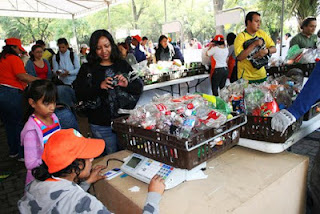Isabel
Becerril has come with some friends to the “barter market” in the Mexican
capital, to exchange 40 kilos of recyclable refuse for fresh produce, sweets
and plants. “This is the first time I have come here, and I like it,” said the
university student , with her ecological bag in hand.
“This encourages people to separate their trash,” says Becerril,
20, a student of graphic design at the Autonomous Metropolitan University
Since March, the Mercado
del Trueque, or barter market, has operated the
first Sunday of each month in the Bosque de Chapultepec, a forested park that
is described as “the lungs of the city”, to the west of the capital. The market is an idea by groups of local vegetable, plant vendors and Mexico City's secretariat of the environment.
The barter
mechanism is simple. In a large white tent, SMA employees and volunteers at 20
tables receive cardboard, paper, glass, aluminium, plastic bottles, electronic
devices and other waste from consumers, weigh the materials, and give the
customers slips of paper which they hand over at kiosks for plastic vouchers
representing the points they earned.
Using these
vouchers, they can buy tomatoes, potatoes, lettuce, lemons and other produce
from farmers from districts surrounding Mexico City
For example,
one kilogram of plastic bottles is equivalent to 24 points, one of aluminium is
worth 16, and a kilo of cardboard or glass, three points each.
And at the vegetable
stands, 20 points can buy half a kilo of tomatoes or potatoes.
The project “has been a success for the farmers,” says Erick
Izquierdo of the Tierra Nueva Cooperative, founded in 2011 to advise small
farmers on agroecological practices.
“The idea is
for people to meet peasant farmers, see what they grow, and value their work,”
he said
In
Xochimilco, one of the 16 administrative divisions of the capital, Izquierdo
raises rabbits and quail, and grows plums, avocados and lettuce.
Recycling is
still in its infancy in Mexico Mexico City
Farmers
participating in the barter market have gained a new place to sell their
produce and earn an extra income, which is paid by the SMA.
The recycling
industry also benefits, because the materials collected are trucked to a
company that processes and prepares them for industrial uses.
The Mexico
City Federal District law on solid waste, passed in 2003, makes the separation
of organic and inorganic waste obligatory, for their management and recycling.





No hay comentarios:
Publicar un comentario